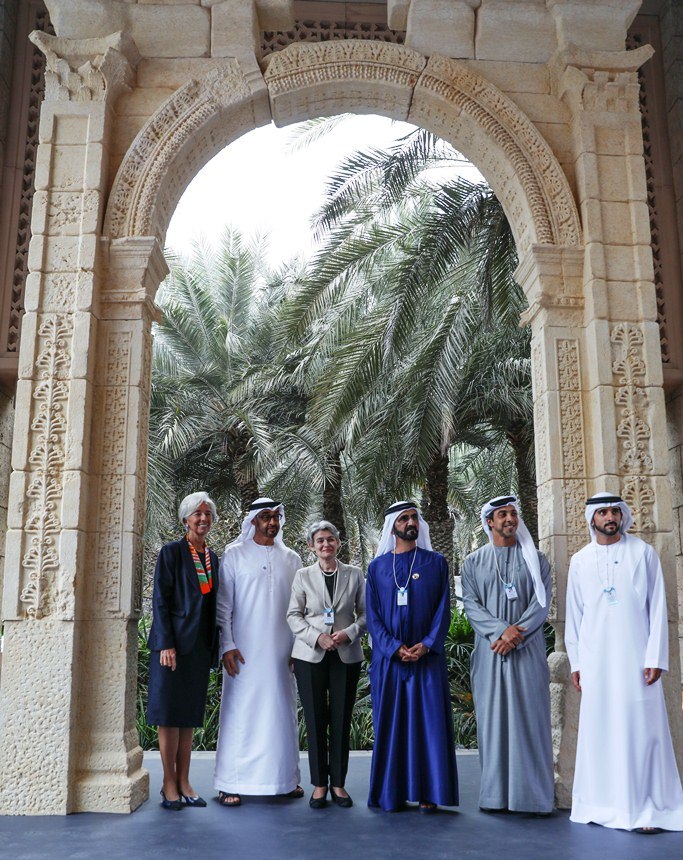Using 3D imagery technology, the replica of Palmyra’s Arch of Triumph, which was created by the Dubai Future Foundation (DFF) to immortalize the historical gateway to the ancient Syrian city, has won the Public Engagement with Research Award, sponsored by the Vice-Chancellor of the University of Oxford.
The replica is the fruit of a strategic partnership between DFF, the United Nations Educational, Scientific and Cultural Organization (UNESCO), the British Institute for Digital Archaeology, and the Universities of Oxford (UK) and Harvard (USA). The international project seeks to document at-risk archaeological sites around the Middle East region using 3D imaging, and then reconstructing them using 3D imagery technology. The end goal is to safeguard the region’s rich history and cultural heritage from vandalism and destruction.
“This initiative is a direct implementation of the UAE leadership’s forward-thinking vision, which calls for utilizing the technologies of the future to preserve our region’s ancient heritage,” said DFF’s Acting CEO His Excellency Abdulla bin Touq. “Receiving Oxford University’s Public Engagement with Research Award demonstrates the global recognition of our success with the Palmyra Arch of Triumph replica. It is an acknowledgement of the soundness of DFF’s Dubai Future Agenda. The Foundation is a trailblazer when it comes to tapping cutting-edge technologies to preserve human and cultural heritage for future generations.”
“The Palmyra Arch of Triumph project is the result of hard work and an effective global partnership,” H.E. bin Touq added. “It is an incentive for us to carry on with our mission, alongside strategic partners from around the world who share our vision for the future. This, in turn, serves to cement Dubai’s status as a global hub for the future industry, and an example for the world to follow in utilizing technologies to find effective solutions to challenges.”
Professor Louise Richardson, Vice-Chancellor of Oxford University, said: “The Award has had an impressive turnout this year; we have received a great deal of groundbreaking scientific research and innovative projects. This reflects our commitment to encouraging the scientific community to get involved with the award, and to draw participants from all segments of society and across all sectors.”
On a similar note, Roger L. Michel Jr, Founder & Executive Director of the Institute for Digital Archaeology, said: “We are proud that the replica of the Palmyra Arch of Triumph was chosen among the entries at the Oxford University Vice Chancellor’s Public Engagement with Research Award. The prize is an international symbol of academic excellence, and we consider this an honor and a form of appreciation for the hard work of our dedicated team of skilled experts. It doubles down on our stated values and intentions to preserve the historical heritage of peoples, and ensure it is passed down through the generations. We are very pleased to be sharing this award with H.E. Abdullah bin Touq and the Dubai Future Foundation, and we commend their ample support for us during this remarkable project.”
The first replica of the Palmyra Arch of Triumph was created in Italy and then showcased in major cities, including London’s Trafalgar Square, New York City’s City Hall Plaza, Dubai at the World Government Summit, Florence during the G7 Summit, and the Khaled al-Asaad Archaeological Museum in Arona, Italy.
The replica is roughly two-thirds the size of the original Arch, measuring 5.5 meters in height and made out of marble using 3D-printing technology, while the replica weighs 11 tons and stands 20 feet tall.
The Oxford University Vice Chancellor’s Award is one of the most prestigious and outstanding international awards that promote scientific research and community participation. The award includes three categories: Projects, Building Capacity and Early Career Researcher.
